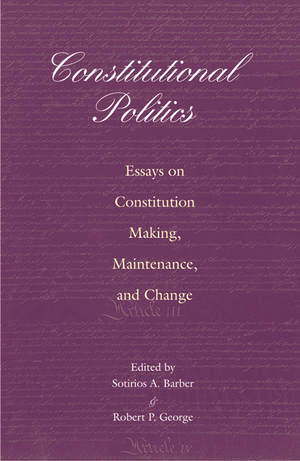With Sotirios A. Barber, eds. Princeton University Press, 2001.
Description from Publisher:
What does it mean to have a constitution? Scholars and students associated with Walter Murphy at Princeton University have long asked this question in their exploration of constitutional politics and judicial behavior. These scholars, concerned with the making, maintenance, and deliberate change of the Constitution, have made unique and significant contributions to our understanding of American constitutional law by going against the norm of court-centered and litigation-minded research. Beginning in the late 1970s, this new wave of academics explored questions ranging from the nature of creating the U.S. Constitution to the philosophy behind amending it.
In this collection, Sotirios A. Barber and Robert P. George bring together fourteen essays by members of this Princeton group—some of the most distinguished scholars in the field. These works consider the meaning of having a constitution, the implications of particular choices in the design of constitutions, and the meaning of judicial supremacy in the interpretation of the Constitution. The overarching ambition of this collection is to awaken a constitutionalist consciousness in its readers—to view themselves as potential makers and changers of constitutions, as opposed to mere subjects of existing arrangements.
In addition to the editors, the contributors are Walter F. Murphy, John E. Finn, Christopher L. Eisgruber, James E. Fleming, Jeffrey K. Tulis, Suzette Hemberger, Stephen Macedo, Sanford Levinson, H. N. Hirsch, Wayne D. Moore, Keith E. Whittington, and Mark E. Brandon.
Table of Contents:
Acknowledgments
Introduction
1. Alternative Political Systems by Walter F. Murphy
2. The Civic Constitution: Some Preliminaries by John E. Finn
3. Judicial Supremacy and Constitutional Distortion by Christopher L. Eisgruber
4. We the Exceptional American People by James E. Fleming
5. Constitution and Revolution by Jeffrey K. Tulis
6. What Did They Think They Were Doing When They Wrote the U.S. Constitution, and Why Should We Care? by Suzette Hemberger
7. Notes on Constitutional Maintenance by Sotirios A. Barber
8. Transformative Constitutionalism and the Case of Religion: Defending the Moderate Hegemony of Liberalism by Stephen Macedo
9. Promoting Diversity in the Public Schools (Or, to What Event Does the Establishment Clause of the First Amendment Hinder the Establishment of More Genuinely Multicultural Schools?) by Sanford Levinson
10. Second Thoughts on the First Amendment by H. N. Hirsch
11. Constitutional Citizenship by Wayne D. Moore
12. The Political Foundations of Judicial Supremacy by Keith E. Whittington
13. Constitutionalism and Constitutional Failure by Mark E. Brandon
14. Justice, Legitimacy, and Allegiance: “The End of Democracy?” Symposium Revisited by Robert P. George
Notes on Contributors
Index

